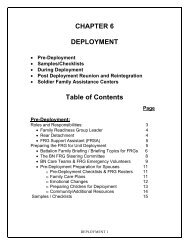A Leader's Guide to Trauma in the Unit - US Army War College
A Leader's Guide to Trauma in the Unit - US Army War College
A Leader's Guide to Trauma in the Unit - US Army War College
You also want an ePaper? Increase the reach of your titles
YUMPU automatically turns print PDFs into web optimized ePapers that Google loves.
<strong>Army</strong> <strong>War</strong> <strong>College</strong> Spouses’ Project<br />
• Involve <strong>the</strong> school. Do not hesitate <strong>to</strong> use counselors and teachers. Their prior<br />
experience with grief and <strong>the</strong>ir relationship with your child will help.<br />
• If a funeral is <strong>in</strong>volved, parents must decide if children should attend. Under <strong>the</strong><br />
age of seven years, experts recommend parents should make <strong>the</strong> decision. Over<br />
<strong>the</strong> age of seven years, experts suggest <strong>the</strong> parents should let <strong>the</strong> children decide.<br />
Take <strong>in</strong><strong>to</strong> account how emotional <strong>the</strong> service will be and how close <strong>the</strong> child was<br />
<strong>to</strong> <strong>the</strong> deceased. If children will attend, expla<strong>in</strong> as much as possible about what<br />
<strong>the</strong>y will see ahead of time — expla<strong>in</strong> <strong>the</strong> rituals. Arrange <strong>to</strong> have a designated<br />
caretaker (who <strong>the</strong> children know) ready <strong>to</strong> take <strong>the</strong>m out if necessary.<br />
• Focus on activities — suggest children write a letter, draw a picture, make a card<br />
and keep a journal of <strong>the</strong>ir feel<strong>in</strong>gs.<br />
• Talk about <strong>the</strong> deceased. Children who have lost someone significant need <strong>to</strong><br />
have memories of <strong>the</strong> deceased that <strong>the</strong>y can carry with <strong>the</strong>m.<br />
• Help <strong>the</strong> child/children f<strong>in</strong>d a support peer group (check your local schools and<br />
hospitals for bereavement groups).<br />
• Do not let your sense of helplessness keep you from reach<strong>in</strong>g out; acknowledge<br />
<strong>the</strong> reality that grief hurts.<br />
Be aware that young children usually see death as temporary and reversible. School-age<br />
children understand <strong>the</strong> world better than younger children and will attempt <strong>to</strong> develop<br />
<strong>the</strong>ir own skills and sense of competency. Understand<strong>in</strong>g and development progress<br />
gradually and at different rates as children mature across <strong>the</strong> age-range. Adolescents have<br />
a better understand<strong>in</strong>g of <strong>the</strong> world than young children; <strong>the</strong>y are capable of<br />
understand<strong>in</strong>g long-term consequences of death and trauma. It is around this time<br />
adolescents beg<strong>in</strong> <strong>to</strong> consider issues of <strong>the</strong>ir own mortality.<br />
When words seem <strong>in</strong>adequate or difficult, here are some appropriate comments or ways<br />
<strong>to</strong> show your concern:<br />
o “I’m sorry that (name) died.” (Not, “I’m sorry about what happened.”)<br />
o “I can’t know how you feel, but I want <strong>to</strong> help you <strong>in</strong> any way I can.”<br />
o “I care about you.”<br />
o “I can see that you are very sad.”<br />
LONG-TERM SUPPORT<br />
Be prepared for a range of feel<strong>in</strong>gs. Children are likely <strong>to</strong> display <strong>the</strong>ir feel<strong>in</strong>gs of<br />
sadness on and off over a long period of time and at unexpected moments.<br />
• Be prepared for negative behavior — anger, restlessness and over-activity.<br />
• O<strong>the</strong>r behaviors <strong>to</strong> prepare for: over-dependency, regressive behavior, denial,<br />
assumed mannerisms, idealization, panic, guilt and curiosity.<br />
There are no set time limits <strong>to</strong> <strong>the</strong> heal<strong>in</strong>g effects of <strong>the</strong> griev<strong>in</strong>g process, however if<br />
<strong>the</strong>re is long-term (several months) denial of <strong>the</strong> death, avoidance of grief or grief that is<br />
________________________________________________________________________<br />
44<br />
A Leader’s <strong>Guide</strong> <strong>to</strong> <strong>Trauma</strong> <strong>in</strong> <strong>the</strong> <strong>Unit</strong> April 2004





